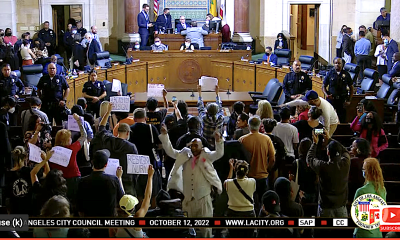It had been just three days since KNOCK-LA and the L.A. Times published the racist recordings that emotionally ransacked the populace, and things were not going well at City Hall.
That morning, then-Council President Pro Tem Mitch O'Farrell had lost the battle with protesters demanding that Gil Cedillo, Kevin de León, and Nury Martinez - the three councilmembers heard on tape spouting anti-Blackness and other forms of bigotry as they plotted to carve up the city in ways that denied Black people voice and power - abandon their posts before city business would be allowed to continue.
Martinez had resigned as council president two days earlier - October 10 - with an apology that was far less defiant, but no more sufficient, than her first. But she had refused to resign from council itself until that afternoon. When she did, it was in true Nury fashion: with an exceptionally long and non-apologetic walk down accomplishment lane that ended with one of the most baffling shout-outs of all time: "To all the little Latina girls across the city – I hope I’ve inspired you to dream beyond that which you can see."
But Cedillo and de León were still holding on for dear life. Cedillo appears to have believed feigning a fugue state was the best way forward, and claimed to have no recollection of the conversation when he was first contacted by the L.A. Times. Though his memory improved as more audio emerged, he remained unwilling to acknowledge having any role in the ugliness beyond that of failed interventionist. De León took the same approach - regretting to have appeared to "condone and even contribute to certain insensitive comments made" while banking on Martinez taking most of the heat for her abhorrent remarks about fellow councilmember Mike Bonin and his son.
NEW: Gil Cedillo, in a statement to Times, apologizes for not intervening when Bonin's son was talked about and says he "failed" in not holding himself to higher standard. He also defends himself. "I did not make a racist statement and I did not mock my colleagues."
— Dakota Smith (@dakotacdsmith) October 10, 2022
Not long after Martinez resigned on October 12, O'Farrell and fellow councilmembers Paul Krekorian, Bob Blumenfield, Curren Price, and Paul Koretz gathered at a podium to ask Cedillo and de León to do the same.
The goal appears to have been to reassure the city that although they, too, were still reeling from what they had heard on the tapes, they were committed to keeping calm and carrying on.
"This council was never divided as you would think, listening to this transcript,” Koretz declared. “This isn't Blacks versus Latinos versus Armenians versus whites versus Jews. This is a united council and it will remain so, and come together even stronger in the future."
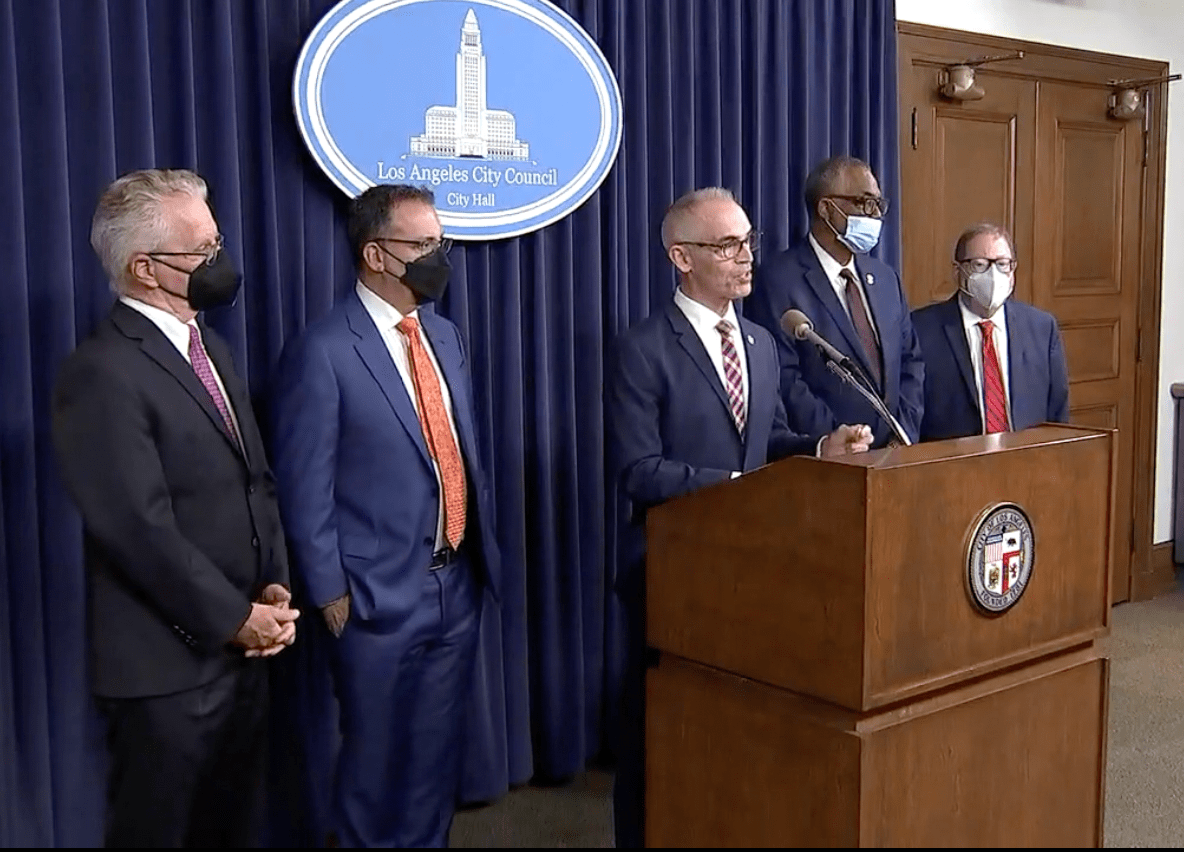
The absence of councilmembers Nithya Raman and Marqueece Harris-Dawson - both of whom had been disparaged at length on the recording - hinted otherwise. Earlier in the day, Spectrum News' Kate Cagle had captured them engaging Black and Latino community leaders as the other electeds kept their distance from the raucous crowd.
Their ability to do so was an indicator of the very different relationship the two have with constituents, particularly those from marginalized communities.
It is also unlikely that either Raman or Harris-Dawson would have stood for the approach of the above assembled non-Avengers, which was to telegraph their respect for their disgraced colleagues’ distinguished careers even as they called for their resignations.
BREAKING: Los Angeles City Council is at a standstill as the heads of BLM-LA and LA Tenants Union urge the council to shut down all meetings until Martinez, Cedillo and de Leon resign. Acting President O’Farrell is intent on carrying on. Officers standing with riot gear. pic.twitter.com/66FqGnYLw5
— Kate Cagle (@KateCagle) October 12, 2022
Though Martinez’ comments were more easily identifiable as racist, the audio made clear that Cedillo and de León were not “bystanders” who failed to call out “bullying,” as Krekorian argued, or who were “too intimidated to say something,” as Koretz posited.
They were active participants and willing perpetuators of deep and divisive harms, full stop.
Suggesting otherwise gives a pass to the very bigotry and division Koretz had just claimed the council wouldn’t stand for. At the very least, it may have emboldened de León to embark upon his embarrassingly flaccid apology tour.
Given the turmoil in Council and his community that his refusal to resign has created, it felt important to catalog just how much de León has to apologize for, and how untenable either his or Cedillo's return is. It also felt important to make clear that while this conversation occurred behind closed doors, it did not take place in a vacuum.
Buckle up.
_________
De León Schools Martinez on What He Believes Black Leadership Is Really Up To
When de León and Cedillo joined Martinez at the House of Labor - or "the Fed" - that fateful day in mid-October 2021, it was to talk redistricting with the now-former president of the L.A. County Federation of Labor, Ron Herrera (the fourth person heard on the recording). The explicit goal - stated many times over by each one of them in different ways - had been to secure their own council seats and strengthen (non-Black) Latino power bases for the long haul. They sought to do so by reinforcing structural anti-Blackness: drawing lines and building alliances that continued to deny power to Black people and the leaders of color that aimed to build power with Black people. All while reminding each other - sometimes gleefully - why they felt entitled to take such retrogressive steps.
De León had been particularly vicious, accusing Black leadership (read: CD8's Harris-Dawson) of trying to strip the Ninth District of its assets so that there would be nothing left for the next councilmember there - who de León assumed would be Latino, given the demographic trends on South Central’s Eastside.
For his part, Harris-Dawson had argued from the outset that his key concerns were addressing the wholesale stripping of assets from the district with the largest Black population during the last round of redistricting and advocating for the redistribution of assets in a more equitable way.
Where Harris-Dawson spoke of righting deeper injustices to the relevant Black and brown communities, however, de León appears only to have seen a calculated affront to Latinos, Latino power, and, above all, to himself.
De León's version of the bigger picture hit Martinez like a lightning bolt. She had previously confessed to not understanding what was behind the tug-of-war between Harris-Dawson and Price, the CD9 councilmember. Now she was beside herself at being told Black leadership was coming for Latinos. "That's even worse!" she shrieked. "That's even more insulting!"
She was so glad de León had caught on to what "they” were doing, she said.
An embittered de León then doubled down. "They're trying to fuck another Latino - meaning me - by saying, ‘We will compensate you, Curren Price, by taking half of downtown away [from de León/CD14] and giving it to you’,” he said. “So they fuck a future Latino from CD9 by fucking a current Latino from CD14.”
“It's so arrogant," he seethed. “So arrogant.”
Here’s part 3 of CM Harris-Dawson’s speech on Expo Park/USC last week. pic.twitter.com/3JJBJMpnie
— Unrig LA (@UnrigLA) December 1, 2021
It was de León’s labeling of councilmember Mike Bonin as the “fourth Black” (Bonin had apparently earned his Black membership by not "fucking ever say[ing] a peep about Latinos," per de León) and resentful grumbling about Bonin having adopted a Black child when there were “all these Latino kids” that opened the door for de León, Martinez, and Herrera to mock Bonin's child, characterize him as an accessory, and even liken him to a Picaninny statue on a plantation.
But Cedillo had not stood idly by.
As Martinez searched for a term to describe what she felt was Bonin's failure to impose discipline on his toddler, Cedillo helpfully interjected the word “boundaries.” As she claimed the "changuito" (little monkey) was about to tip the King Day parade float over, Cedillo can be heard chuckling and saying, “Jeez.” When she cackled about wanting to give the boy a "beatdown," he agreed and suggested that maybe the child “needs a pinch, something...” And when Herrera said that Bonin, who is white, and his son wouldn’t have been safe alone in South Central because the (presumably Black) “spectators would beat his ass,” Cedillo said, "Yeah," affirming that the community was too violent to set foot in.
I haven't heard @kdeleon address this at any point during his apology tour. https://t.co/Vty6IRXvqf
— sahra (@sahrasulaiman) October 23, 2022
_______
"It Goes Back To...What Has [Eunisses Hernandez' Black] Mentors Done for Our Peeps?" - Ron Herrera
While it is true that Cedillo's sentiments were somewhat more tempered throughout the majority of the recording, his approach to the redistricting process shared his colleagues' zero-sum assumption that a win for Black leadership constituted a loss for the Latino community.
It was time, he said, for Latinos to exercise their power. He could only "support one, maybe two" Black-held seats along L.A.'s historically Black corridor. Ticking off a list of other communities that continue to have Black leadership but have since seen marked turnovers in population (e.g. Compton, Inglewood, Gardena), he explained that these, too, should be Latino seats.
The underlying dilemma he was getting at is rooted in something real: these communities' compositions have indeed shifted, sometimes dramatically, over the years. And while there is significant overlap with regard to the needs and aspirations of the historically disenfranchised Black population and the Latino population (including via the sizable population of Black Latinos and blended families who tend to be erased in these discussions), there also can be significant divergence. Rather than uplift and make room for both, however, this city's more privileged leadership has tended to exploit those divergences to maintain a favorable status quo for whiter, wealthier stakeholders, ultimately leaving both Black and brown communities to battle it out for scraps.

The division and distrust sown by divide-and-conquer over the years have subsequently complicated efforts to bridge- and power-build between Black and brown communities - something Martinez, de León, and Cedillo are all aware of. More than once, Martinez suggested she was seeing an iteration of that dynamic now, derisively claiming the judíos (Jews) had already "cut their deal with South L.A. - that's how I see it. And they're going to screw everybody else."
But rather than discuss how to thwart real or perceived divide-and-conquer, they all seized the opportunity to lean into it.
Describing the Latino councilmembers' position as "us...who believe in unions and helping poor Latinos," Herrera framed their "little Latino caucus" as an active and necessary counterbalance to two camps that explicitly favored Black-brown solidarity. On one side, he said, was Harris-Dawson and CoCo (or Community Coalition - the powerful South Central organization co-founded by Congresswoman and current mayoral frontrunner Karen Bass and led by Harris-Dawson for many years). On the other stood supporters of Cedillo's progressive then-challenger for the CD1 seat, Eunisses Hernandez (Hernandez later unseated Cedillo in the June primary). According to Herrera, the problem with Hernandez was that her political lineage could also be traced back to Black leadership - namely, to Bass via Assemblymember Isaac Bryan. "Gil [Cedillo] and I were talking about it - it's deeper than you think," explained Herrera. "It goes back to, you know, um, what has her mentors done for our peeps?"
Had he believed differently, Cedillo could have easily corrected Herrera. Or exercised some form of leadership at this moment. But he had no objection to perpetuating antagonism. In his experience, he said, the "benevolent" mission statements of organizations like CoCo belied anti-union stances and a prioritization of equity for Black workers over parity for Latino ones.
More concerned about losing his own personal power base than anything, Cedillo said his redistricting objectives were simple: “Protect me, advance me, go west” and stop penciling “headaches” - white or gentrifying areas - into his district because “I don’t need that. I have poor people - La Raza.”
Those who have listened to the full leaked recording know that such a declaration did not mean Cedillo was above mocking the “poor people” in question. He can be heard laughing along with Martinez' comments about the “little short dark people” from remote villages - Oaxacans - in Ktown and joking about how some even wear shoes.
But this, too, was nothing new for Cedillo. He has openly mocked poor people of color in council before, as he did during the battle over the $1 billion hotel and residential project planned for Historic South Central back in 2016. Although the community bore the distinction of being the most overcrowded neighborhood in the country at the time, with high housing costs forcing multiple families to squeeze into two- and three-bedroom apartments, Cedillo had aligned himself against the deeply impoverished renters fearing gentrification and displacement. During a lengthy soliloquy, he lauded councilmember Price - who cut questionable electronic billboard deals and pitted the unions against area tenants to push the project through - for his "brilliance," his "genius," and, inexplicably, for having “put on his big boy pants." Cedillo also made a point of taking aim at another favorite target - community organizers working on behalf of lower-income Black and brown tenants - saying they had nothing to offer but "chants," "slogans," and complaints that the "project doesn’t…cure cancer.”
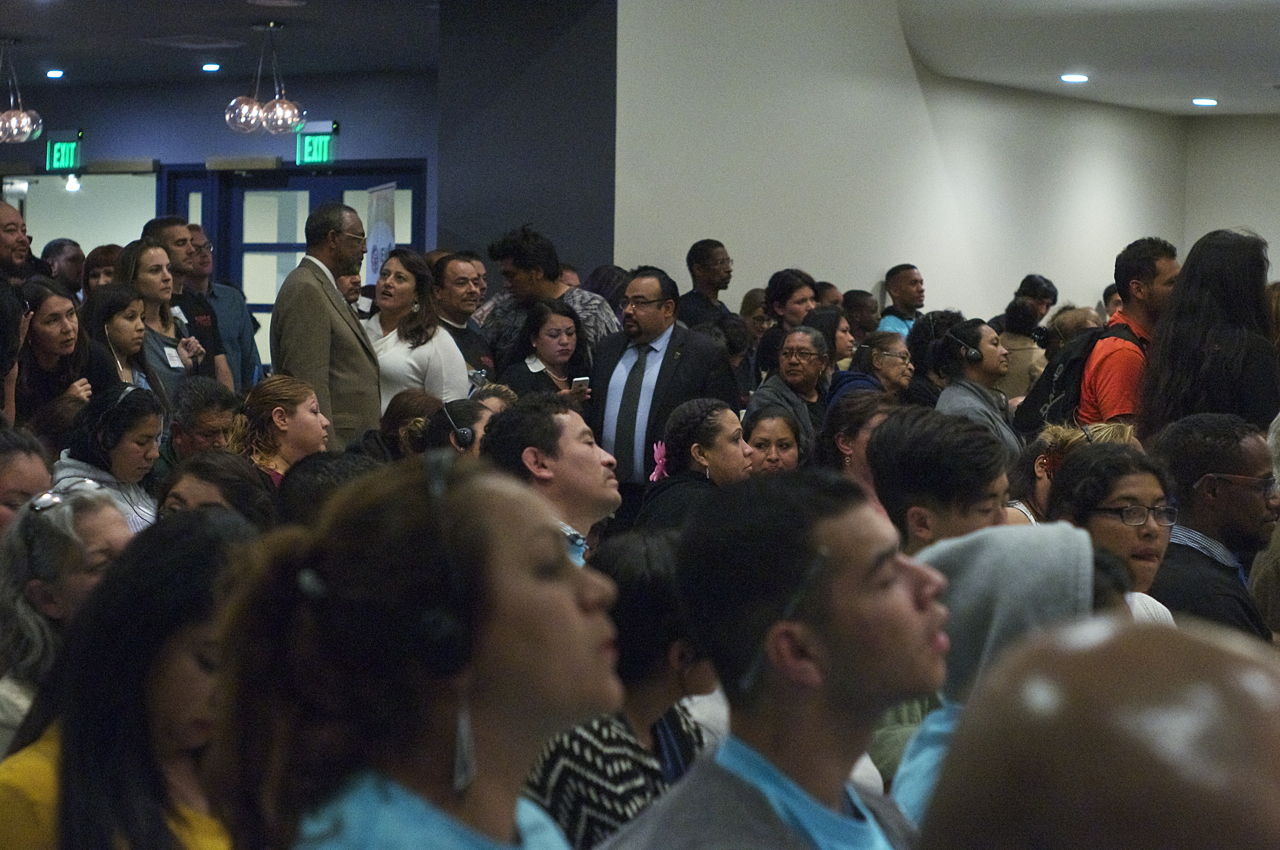
So when the discussion turned to the question of how to fill Mark Ridley-Thomas’ tenth district council seat after the powerful Black South L.A. leader was indicted on federal corruption charges, it was no surprise to hear Cedillo crassly lamenting with de León that "25 Blacks...shouting" had a disproportionately loud voice. Or concurring with Herrera’s claim that any replacement candidate would need to be staunchly anti-CoCo. Or responding to Martinez’ concerns that they would be accused of launching a “hostile takeover” of the seat by suggesting a Black woman, Heather Hutt, as “the one who will support us” and someone "we can live with."
It was also no surprise that none of the participants thought to mention what, if anything, they had to offer Hutt's community in return.
_______
Leveraging Anti-Blackness to Limit Discussions about Racial Justice
Per the L.A. Times, the Labor Federation’s first reaction to inquiries about the recording was to threaten legal action and claim that “innocent people” - presumably the participants, not the public - would be harmed if it were to be published.
Yet the participants themselves did not confine that conversation to that room. It was part of an ongoing series of discussions they'd been having with power brokers in and across their respective communities. They had alluded to as much on the recording.
Though they likely dialed back the overt anti-Blackness and/or self-preservation, depending on the audience, they clearly weren't shy about pushing the objectives driven by those sentiments.
Martinez herself proudly recounted how she'd told her political ally, L.A. Sentinel Publisher Danny Bakewell, that Bonin thought he was Black. It had come up while they were talking redistricting and how the struggle over assets between CD8 and 9 could hurt Price's re-election bid. She said she'd encouraged Bakewell to push Harris-Dawson to get the airport from "that little b*tch Bonin" rather than trying to reclaim USC/EXPO from his "brother" (Price). She also divulged she had just given the same advice to Price, letting him know how unfair she thought it was that he had "busted [his] ass" to bring investment to CD9 only to have "this guy" - Harris-Dawson - swoop in and steal it from him. That does not appear to have been the only conversation participants had with Price on the subject. His November 5 motion to keep the existing assets in his district was seconded by de León. And a month after the Fed meeting, Price's op-ed in the Sentinel mirrored several of the arguments Martinez, de León, and the others had made, including a pointed challenge to Harris-Dawson to "look west to the Los Angeles International Airport" and to lay off the "calculated move" to "disenfranchise my District."
Some of the Fed Four's talking points also surfaced via civilian proxies claiming to speak on behalf of CD9 (and occasionally CD14) beginning in early October 2021.
It might not have been so noticeable if the barrage of coordinated comments to the redistricting commission hadn't had such aggressively resentful scripts. But the arguments, language, hostility, anti-Blackness, and specific targeting of Harris-Dawson, CoCo, and Karen Bass closely paralleled the recording and set them apart from genuine constituent concerns (e.g. what a loss of assets might mean for hard-won community benefits agreements).
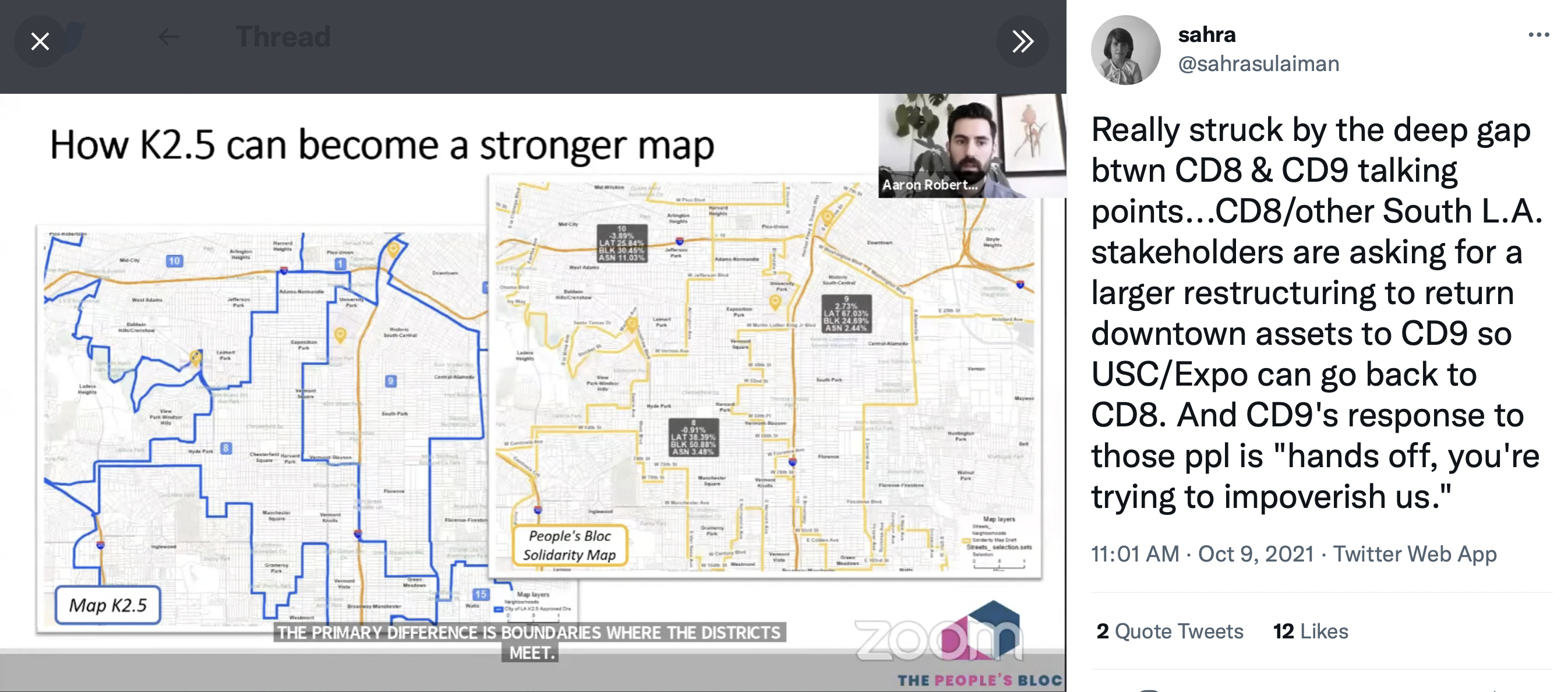
First, speakers accused CD8 and Harris-Dawson, "the African American that represents CD8," of trying to deny Latinos the chance to prosper and of stealing unearned assets from hardworking people. After the CoCo-led People's Bloc coalition presented their suggested map (above, in yellow) to the commission on October 9, commenters blasted CoCo with fresh anger. They claimed the organization was "attempt[ing] to take power away from Immigrant, black and brown poor communities" and "pushing to move USC and Expo Park to CD8 so that the financial benefits remain in the hands of one councilman who is African American." They also asserted that CoCo "has a political agenda that will harm our community." Several demanded those affiliated with CoCo be banned outright from being able to provide input. Others listed off a handful of Latino/immigrant-serving groups that had split from the People's Bloc as evidence that the map was invalid.
Most strikingly, starting around October 13, CD9 commenters centered de León again and again and again, echoing the exact argument that he would make to Martinez a few days later: e.g. that Harris-Dawson, Bass, and CoCo were seeking "to harm District 14, which is Kevin de León; he will run for mayor in 2022 against Karen Bass who is the former CEO of Community Coalition."
👀 new caller, *same* talking points.
Is this a sign of a CD9/14 alliance sprouting up? If CD9 loses USC you know they’ll be asking for more of DTLA so… https://t.co/Jy7OYyABqR pic.twitter.com/78NwaOTU4a
— Unrig LA (@UnrigLA) October 14, 2021
De León had only launched his lackluster bid for mayor a month earlier, and would ultimately finish a very distant third in the primary, with under eight percent of the vote.
Still, the claims Harris-Dawson, CoCo, and Bass were all out to harm de León and Latinos served a more immediate aim: bolstering redistricting commission chairman Fred Ali's decision to label the CD8/CD9 asset transfer debate a political issue. Such a designation put it outside the commission's purview and kicked it over to council, where it was more easily buried.
The antagonism ginned up against Bass may also have assisted both de León and billionaire Rick Caruso in winning over some of the most heavily Latino precincts in CD9. Neither made real inroads in CD8, or even west of Main in South L.A. And de León's candidacy did not resonate in other districts with significant Latino populations (i.e. CD1), including parts of his own.

________
Anti-Blackness Disguised as Solidarity: The Heather Hutt Confirmation
While making his wretched apology rounds, de León has steadfastly dodged accountability for anti-Blackness. He told Telemundo’s Julio Vaqueiro that Martinez was the one who made the “horrible” racist remarks. And he outright lied to KBLA Talk 1580 host Tavis Smiley, claiming that he had suggested CD8 pursue the airport during redistricting because his driving concern was the expansion of the Black middle class. He also told ABC7’s Marc Brown that there was only one single moment where he failed: not speaking up to defend the Oaxacan community.
When pressed about why he, a 55-year-old man who has held some of the most powerful leadership positions in the state, would have felt cowed into silence by a handful of colleagues behind closed doors, de León explained that the audio hadn’t captured the full story. "You couldn't see it, but I had a very disparaging look on my face,” he said, likely referring to the split second of uncomfortable silence heard when Martinez cackled about how "ugly" the Oaxacans were. But “unfortunately, sadly,” he said, he now had to deal with the fallout from having an inaudible face.
The cowardly denials stand in marked contrast to the shamelessness with which de León leveraged Blackness and Black people during the push to fill Ridley-Thomas’ vacant CD10 seat.
When the opportunity finally arose this past August to install Heather Hutt – the Black woman the cackling cabal had settled on almost a year earlier – de León helped ensure her race was always at the forefront of the conversation.
Martinez took the lead, first nominating Hutt in council on August 26, then sending out a misleading press release implying her “appointment” was a done deal. The Sentinel, which had previously supported Hutt’s failed Assembly bid (and also backed Martinez’ nomination of former CD10 councilmember Herb Wesson to take the seat in February), printed the announcement in full.
Martinez' announcement did not mention that councilmembers Bonin, Harris-Dawson, and Monica Rodriguez had filed a counter motion aimed at making the process of filling the vacancy more transparent. It did, however, feature comments from de León emphasizing that Hutt would be “only the third African American woman to serve” in council.
Of course, Hutt needed to be confirmed first - she could not be appointed by Martinez. But suggesting otherwise served an important purpose: it made it appear to constituents that anyone who raised questions about the rushed process was creating excuses to block a deserving Black woman’s rightful ascension to power.
That, in turn, gave the three councilmembers a hill to martyr themselves on. Which they did with astonishing gusto.
In session on August 30, Cedillo and de León openly admonished their colleagues for not showing Martinez more deference or allowing her to fulfill her “duty” and “the promise of democracy” by putting Hutt in the seat. Cedillo even declared with uncharacteristic vim that “Representation delayed is representation denied!”

De León continued to underscore to Hutt’s supporters - a great number of whom were present that day and holding signs that read “Black women are watching” - that Hutt would be “the first Black woman [councilmember] in the history of CD10.”
Flying high on his own supply, he then dedicated several truly extraordinary minutes to addressing the Times' editorial board's concern that something “shady” was afoot.
The Times was referring to this being Martinez' second rushed attempt to fill the vacancy. The first, back in February, had resulted in former council president Wesson being temporarily blocked from serving by a judge just two days after Martinez pushed his confirmation through. The nomination of Wesson, her longtime political ally, had been controversial as it was. So was Wesson's decision to unceremoniously fire Ridley-Thomas' staff and appoint Hutt as his chief of staff once the judge finally cleared him to serve in March.
Martinez said she had decided to nominate Wesson after getting a green light from the CD10 constituents she had met with. But some of those constituents, including Ridley-Thomas’ allies in the faith community who were already unhappy about his suspension, told the Times they had felt “disrespected" during their meeting. Defiant as always, Martinez told the Times that she was a strong woman and that those complaining were making it "about my tone" because they didn’t like the answers she gave. The Southern Christian Leadership Conference of Southern California would eventually file the lawsuit that forced Wesson to resign on August 25. Both the Times and the dissenting councilmembers were rightly concerned that Martinez' announcement about Hutt's "appointment" the very next day shut district constituents out of the process completely.
De León, however, preferred to take the editorial board's questions personally.
After muttering sarcastically about the Times' "interesting" choice of language, he put his hand on his heart to demonstrate how sincerely he believed that Hutt's nomination process had been a shining example of transparency. And one that he had absolutely nothing to do with.
“Now, I wasn’t there,” he said of how Heather Hutt had come to be the candidate for CD10. “So the question I ask is, 'Did Heather Hutt express a desire to become a voting representative of this council district based on her experience and understanding of the district in which she was born and raised in? And as a result, did she speak to Council President Martinez about her desire?'”
He couldn't say. But he assumed - and this was “purely conjecture” on his part, he said, returning his hand to his heart - that Hutt had been the one to approach Martinez. And Martinez, in turn, he presumed, had rightly told Hutt she would have to do due diligence and make the case for her candidacy with each of the other members of council.
“That, my friends, is democracy in action," he declared, triumphant. "It doesn’t sound like a black, uh, back-room deal. It sounds like a woman, a woman of color, a Black woman, to be specific, who has the audacity to believe that she could be the voice and the vote of CD10.”
Then the guy who complained that, much like the man behind the curtain in The Wizard of Oz, "25 Blacks" shout "like they're 250" paused to bask in their applause.
When five dissenting councilmembers still managed to block consideration of Hutt's nomination that day, Martinez one-upped de León, wielding Blackness like a flamethrower.
In a bitterly biting speech, she accused the naysayers - including the Black councilmember, faith leaders, and constituents who praised Hutt but were concerned about the community being shoved aside - of “not hav[ing] the courage to…deal with the merits of this Black woman that’s here today.”
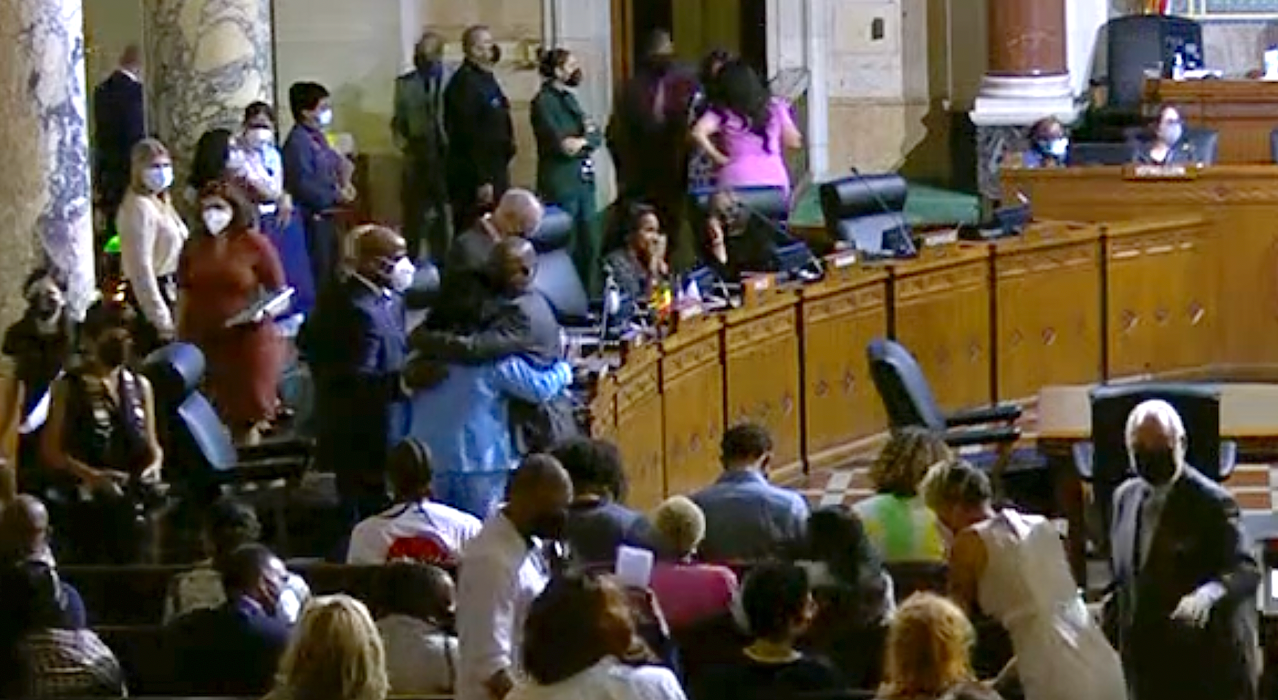
She also addressed Hutt directly, saying that as a woman of color herself, the struggle to be seen as a qualified candidate "was all too familiar."
“It’s unfortunate that when we’re living at a time when people say they want to empower women of color and they want to see us lead, you can see time and time again that it is an impediment for some of these folks to see us lead because we don’t take cues from them," she told Hutt. "And that is what precisely this is about.”
She then pushed Hutt's nomination forward via the Rules Committee the next day, ensuring Hutt would be confirmed when council reconvened on September 2.
If the woman who had spat "Fuck that guy [D.A. George Gascón]...he's with the Blacks," characterized a Black toddler as "[Bonin's] negrito," and plotted to install a candidate whose race and community standing would provide the non-Fab Four cover as they worked to curb Black power felt any shame about weaponizing Hutt's race, it was not evident during that next session.
Instead, she and her co-conspirators were practically giddy.
Cedillo gave a shout-out to Wesson's "infinite wisdom" in appointing Hutt as his chief of staff earlier that year and again tsk-tsked those who worried about proper democratic process.
De León touted his own history of helping other Black leaders, including "my friend, Big Izzy" (former State Senator Isadore Hall, seen below), ascend to positions of power in Sacramento. He also professed his respect for "Black political royalty," name-checking retired State Senator Kevin Murray (also seen below), before returning to his favorite applause line: Hutt serving as the "first woman, first woman of color, the first Black woman in the history of CD10."
"Felicidades," he concluded, turning to praise the "mosaic, the rich tapestry of people of color" present in chambers. "We've got Latinos here. We got Salvadoreans here. We got Mexicans here. We got African Americans here. We got Koreans here...Because our diversity is our strength when we come together."
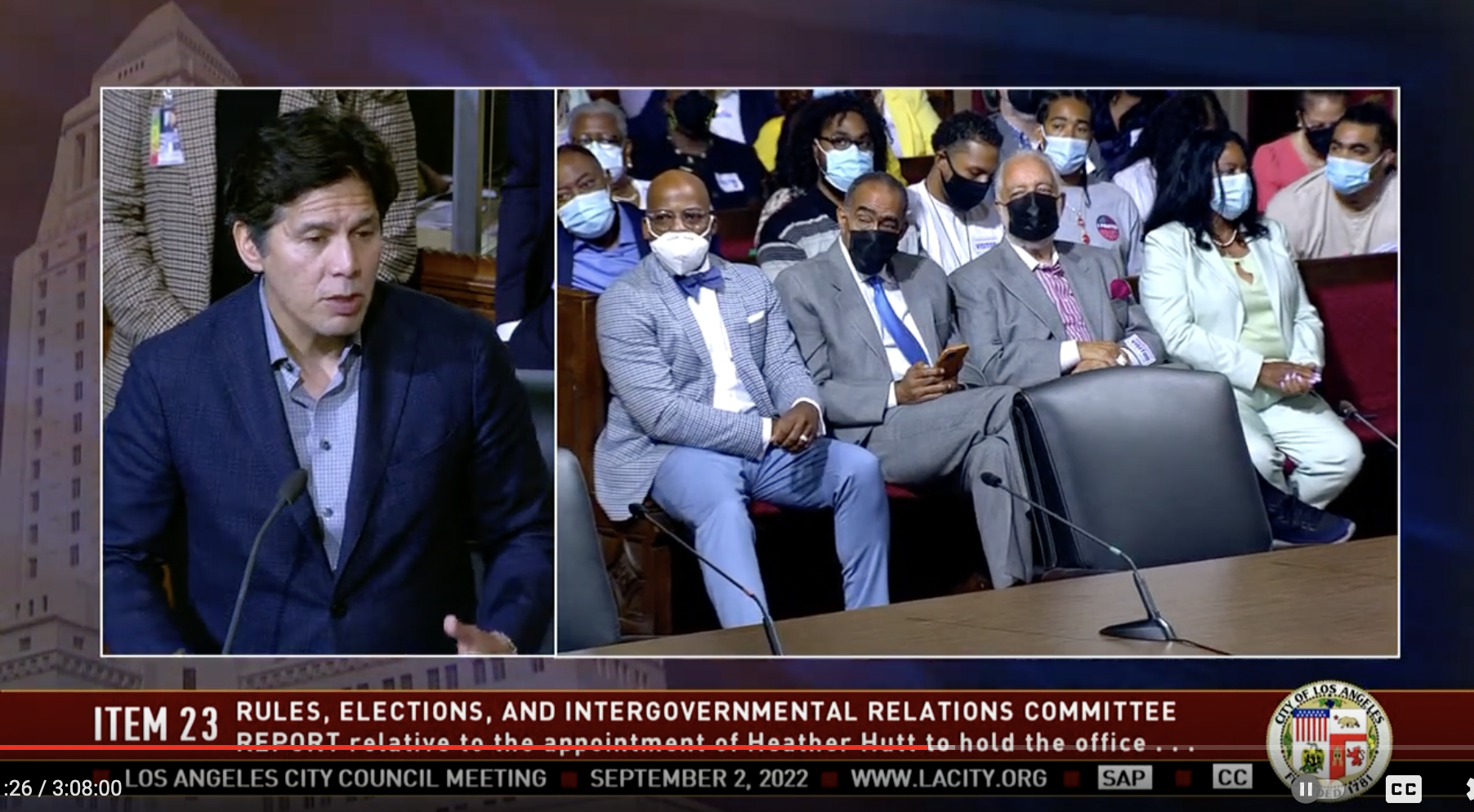
Martinez was still heated about having had her authority challenged, so she began by reaming others for having questioned her intentions, declaring she would not allow process to get in her way or determine her legitimacy. Centering herself, she also suggesting the pushback she had received had been about her own race and gender.
"Heather, as women of color, we're enough. We are enough. We ARE enough!" she declared. "We cannot allow these words to make us feel any less!"
Then she scooched in alongside Hutt at the center table, grabbed her hand, and held it up in triumph.

_______
Resignations and Reckonings
City Council has called a special election to fill the seat left behind by Martinez. Both Cedillo and de León have been censured and stripped of their committee assignments, but continue to resist calls for their resignations.
Cedillo's term is up on December 11, and he may very well remain ostriched in his "place of reflection" - and on the taxpayers' dime - until then.
De León's term doesn't end until 2024. Yet despite becoming the latest subject of a recall effort, he continues to hold fast to the idea that his voice is the one his constituents want and need, regardless of how absurd it sounds, even to him.
The silence. https://t.co/SSyifNPsbh
— Mekahlo Medina (@MekahloNBCLA) October 25, 2022
In the meanwhile, Council has some reflection of its own to do.
While speaking to KPCC’s Larry Mantle about the scandal on October 14, for example, councilmember O’Farrell spoke about how shocking it was to hear the effort to disenfranchise Black voters play out on that recording. Yet he had been present for the public side of those debates in council. Most notably, he had supported Martinez by seconding her nomination of Hutt and by not objecting to the counter motion seeking greater transparency being kicked to committee and scheduled for consideration after the council vote to fill the seat would already have been taken. Then, in session, he had advised his colleagues who were concerned about the disenfranchisement of Black voters to do “the decent thing” and not “get bogged down in process.” And he made those comments despite having just watched Martinez first pretend to misunderstand Harris-Dawson’s objection to consideration of Hutt’s appointment and then throw shade at him, implying he didn’t know council rules or procedure. [See those moments here.]
Both Harris-Dawson and Bonin have since aired some of their frustrations with how difficult it was to direct council’s attention to the city’s most vulnerable residents with Martinez at the helm. When speaking to Spectrum News, Harris-Dawson recalled multiple occasions where the concerns he raised about negative impacts of this or that policy on Black people were regularly steamrolled. And Bonin’s October 18 twitter thread points to a number of instances where Martinez punished her political enemies - often with the assistance of her allies, including O’Farrell - to the detriment of Black and brown Angelenos in need.
We’ve all heard the ugly things three of my colleagues said on the infamous tapes.
— Mike Bonin (@mikebonin) October 19, 2022
It is also important to remember what they did. The legislation they killed, stalled or weakened. The laws and programs they stopped that would've helped people. The bad policies they passed.
🧵
Council's shortcomings will not be fixed if/when de León and Cedillo finally abandon their seats, in other words.
And while proposals to expand council, make redistricting fully independent, and limit councilmembers’ discretion over land-use decisions sound good, in theory, they will need to be crafted in such a way as to account for structural injustices and imbalances. The fact that the councilmembers at that October 12 press briefing could not (or would not) identify the various ways in which anti-Blackness manifested on that recording unfortunately does not bode well in that regard.
Either way, neither de León nor Cedillo could possibly have anything of value to contribute to a deeper reckoning within council. The tape made clear that they prioritized their own survival above what was best for the communities they served, just as they continue to do now.
Their departure can't come soon enough.
_______
Hear the full leaked recording, here. Find me on twitter: @sahrasulaiman.
